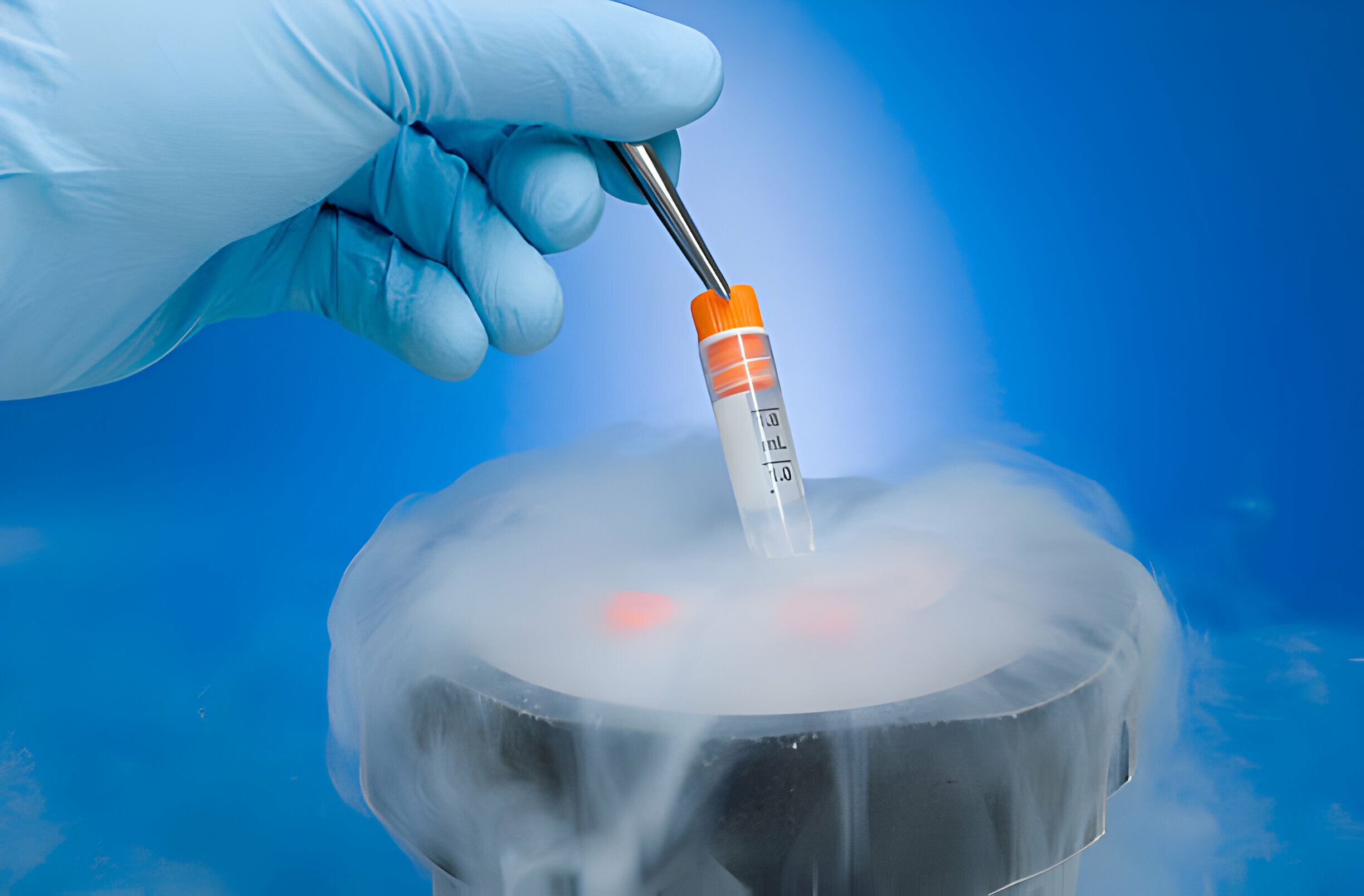Embryo Freezing
A proactive and efficient path to future pregnancies with advanced cryopreservation.
What is Embryo Freezing?
Embryo Freezing, or embryo cryopreservation, is a highly effective fertility preservation technique. It involves carefully freezing high-quality embryos created during an IVF cycle for use in a future pregnancy attempt. This process allows couples to undergo a fresh IVF cycle and, if they have surplus embryos, to freeze them for later use. This provides an efficient way to achieve additional pregnancies without the need for further ovarian stimulation, which can be both physically and financially demanding.

Who Should Consider Embryo Freezing?
Embryo freezing is a valuable option for several patient groups, offering flexibility and increased chances of success.
Patients with Surplus Embryos
Couples who have high-quality embryos remaining after their first fresh IVF cycle can freeze them for a future attempt, saving them the need to go through ovarian stimulation again.
Fertility Preservation for Future
Couples who wish to delay having more children can freeze their embryos to ensure a high-quality option is available to them for future pregnancies.
Before Medical Treatments
For patients facing cancer treatments or other medical procedures that may affect fertility, freezing embryos offers the highest chance of future success compared to egg or sperm freezing alone.
Your Journey: The Embryo Freezing Process
Our meticulous process is designed to be safe, comfortable, and highly effective for long-term preservation.
1. IVF & Embryo Culture
Embryos are created during a standard IVF cycle and cultured in our lab for 3-5 days. Our embryologists identify and select the healthiest, high-quality embryos for freezing.
2. Cryopreservation
The selected embryos are prepared with a special cryoprotectant solution and then flash-frozen using an advanced technique called vitrification.
3. Long-Term Storage
The vitrified embryos are stored indefinitely in a secure cryogenic tank filled with liquid nitrogen, where they can be preserved for many years without losing their viability.
4. Frozen Embryo Transfer (FET)
When you're ready, the embryos are carefully thawed and transferred to the uterus during a simple, non-surgical procedure to begin your pregnancy.
Success, Risks & Cost Considerations
Success & Factors Affecting Outcomes
Embryo freezing with modern vitrification techniques has very high success rates. The chances of a successful pregnancy after thawing are often equal to, and sometimes even higher than, a fresh embryo transfer, as the uterus is not under the stress of ovarian stimulation. Success depends on the embryo's quality at the time of freezing, as well as the woman's age and health.
Risks & Cost
Embryo freezing is a very safe procedure with minimal risks. The main considerations are financial, including the cost of the freezing process and annual storage fees. Our clinic is committed to providing a transparent and detailed breakdown of all fees during your consultation, ensuring you have a clear understanding of the costs involved in your family-building journey.
Why Choose Isha for Embryo Freezing?
At Isha Women's Hospital, our commitment to your future and peace of mind is our top priority. We combine advanced technology with a compassionate, personalized approach.
Advanced Vitrification
We use the latest flash-freezing technology (vitrification) to ensure the highest survival rates for your embryos upon thawing.
Experienced Embryologists
Our team of experienced embryologists meticulously handles every step of the process, from selection to long-term storage, ensuring the highest standards of care.
Secure Cryogenic Storage
Your frozen embryos are stored in a secure, state-of-the-art cryogenic facility, providing a safe and reliable environment for long-term preservation.
Holistic Patient Support
We provide holistic support and guidance throughout the process, addressing all your questions and concerns to ensure you feel empowered and confident.
Meet Our Founder & Leading Specialist

Dr. Chinmay Pataki
M.D GYNEC, IVF Specialist
Dr. Chinmay Pataki, the founder of Isha Women's Hospital, is a renowned specialist in fertility, gynecologic laparoscopy, and high-risk pregnancies. His journey is marked by excellence, including being a university rank holder and a Gold Medalist in M.D. Gynecology.
He has trained at world-class institutions, including Weill Cornell Medical College in New York for male infertility and Micro-TESE for zero sperm count, and in Germany and Italy for advanced laparoscopic surgeries. With over 10,000+ IVF cycles and 15,000+ laparoscopies to his name, Dr. Pataki's expertise ensures that you are in the most capable hands. He is a true pioneer in reproductive healthcare, dedicated to helping both women and men on their path to parenthood.
Frequently Asked Questions
Who should consider embryo freezing?
Embryo freezing is ideal for couples who have surplus high-quality embryos from an IVF cycle, wish to have more children in the future, or need to preserve their fertility before undergoing medical treatments that could affect their reproductive health.
How is embryo freezing different from egg freezing?
Embryo freezing is the cryopreservation of a fertilized egg, or embryo, while egg freezing preserves an unfertilized egg. Embryo freezing is often preferred as it has a slightly higher success rate because the embryo has already successfully undergone fertilization and early development.
How long can frozen embryos be stored?
Embryos can be stored indefinitely in our secure cryogenic tanks without any significant decline in quality. The age of the embryo remains the age at which it was frozen, regardless of how long it is stored.
What is the cost of embryo freezing?
The cost of embryo freezing includes the initial freezing process and annual storage fees. As costs can vary, we provide a transparent and detailed cost breakdown during your consultation to help you plan accordingly.
What is a Frozen Embryo Transfer (FET) cycle?
A Frozen Embryo Transfer (FET) is a cycle where a frozen embryo is thawed and transferred to the uterus. Unlike a fresh IVF cycle, it does not require ovarian stimulation, making it a simpler and less expensive procedure.
Is pregnancy with frozen embryos as successful as with fresh embryos?
Yes, with modern vitrification techniques, the success rates of a frozen embryo transfer are often comparable to, and in some cases even higher than, a fresh embryo transfer. This is because the uterus is in a more natural state, without the effects of ovarian stimulation.
Hear From Our Happy Families
Ready to Plan Your Journey?
Schedule a consultation with our experts to discuss how embryo freezing can help you plan your future.
Book a Consultation